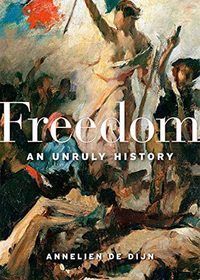
- University of Amsterdam
- Assistant Professor
- Affiliation During NDIAS Fellowship: University of Amsterdam
- Residential Fellow (2010-2011)
- “The Conservative Enlightenment: Political Thought Before the Triumph of Democracy”
Annelien de Dijn specializes in the history of political thought in Europe and in the United States, from 1700 to the present, especially the contested birth of democracy in the West. Her current research is focused on the nature of the Enlightenment in England and continental Europe. She is also working on a second project on the changing meanings of the concept of freedom in the West from the Middle Ages to the present.
Professor de Dijn has held visiting appointments at Columbia University, Cambridge University, and the University of California at Berkeley. In July of 2011 she will begin an appointment as an assistant professor of political theory at the University of Amsterdam. Her publications include French Political Thought from Montesquieu to Tocqueville: Liberty in a Levelled Society? (2008) and more than 10 articles and other works. She is the co-editor, with Raf Geenens, of Reading Tocqueville: From Oracle to Actor (2007).
She is the past recipient of fellowships from the Belgian-American Educational Foundation (1999-2000), the Belgian Foundation for Scientific Research (2000-2004, 2005-2008), the Remarque Institute at New York University (2005), and the Fulbright Program (2005-2006).
Publications
-
Freedom: An Unruly History
Harvard University Press, 2020

We tend to think of freedom as something that is best protected by carefully circumscribing the boundaries of legitimate state activity. But who came up with this understanding of freedom, and for what purposes? In a masterful and surprising reappraisal of more than two thousand years of thinking about freedom in the West, Annelien de Dijn argues that we owe our view of freedom not to the liberty lovers of the Age of Revolution but to the enemies of democracy.
The conception of freedom most prevalent today—that it depends on the limitation of state power—is a deliberate and dramatic rupture with long-established ways of thinking about liberty. For centuries people in the West identified freedom not with being left alone by the state but with the ability to exercise control over the way in which they were governed. They had what might best be described as a democratic conception of liberty.
Understanding the long history of freedom underscores how recently it has come to be identified with limited government. It also reveals something crucial about the genealogy of current ways of thinking about freedom. The notion that freedom is best preserved by shrinking the sphere of government was not invented by the revolutionaries of the seventeenth and eighteenth centuries who created our modern democracies—it was invented by their critics and opponents. Rather than following in the path of the American founders, today’s “big government” antagonists more closely resemble the counterrevolutionaries who tried to undo their work.